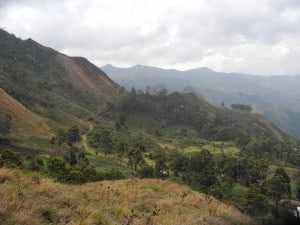
After one year of the implementation of the Mt Bamboutos Echinops giganteus Project, some 120 Farmers in the Magha-Bamumbu pilot community resolved to increase their participation in the project through the domestication of the Echinops giganteus plant. These Farmers will be responsible for the production, collection and supply of the roots of the plants for eventual commercialisation. This follows a 10-day field visit during the month of September carried out by the Project Assistant, Lea Kenmene to register all family heads in the project area. Out of the over 160 family heads present in the Magha Community, 120 accepted to domesticate the plant. The aim of involving the local community in the domestication of this plant is to permit the indigenes derive their own benefits from the valorization of the natural resource. The farmers were schooled on the socio-economic importance of the plant including its pharmaceutical and essential oil potentials. They received the idea of domesticating the plant with a lot of happiness.
The Convention on Biological Diversity (CBD) provides the general legal framework within which mechanisms concerning the Access Benefit Sharing principle of natural resources is conducted. The actual implementation of the ABS in Cameroon is expected to be largely at the national level. The Echinops giganteus project is the first project of its kind trying to concretize the Access and Benefit Sharing principle in Cameroon.
Since the launching of the project in 2012, there has been a huge success in the research and testing of the plant to unravel real value of the plant. The Echinops giganteus project is funded by French charity, Man & Nature.
By Lea Alida Kenmene




